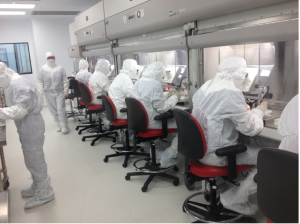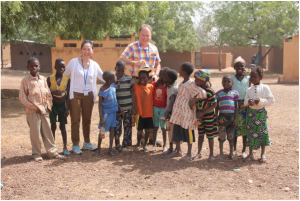Dreaming of an end to malaria in our lifetime: Dare to dream with us?
Some folks are dreaming of an end to malaria in our lifetime – not through persistent vector control, or diagnosis and treatment efforts alone, but through vaccination. Of course, there isn’t a malaria vaccine yet, but what if there were one? What role could Community Health Workers (CHWs) play in helping to end malaria with a vaccine?
CHWs have long been recognized for their ability to deliver basic care and preventative services to rural populations, impact on maternal and child health, and provide a legacy of health promotion in underserved communities. We wrote recently about the tremendous impact CHWs can have in malaria control, prevention, and treatment.
And CHWs have been exceptionally influential in increasing access to immunization in rural areas. Both field clinics and home visits provide hard-to-reach communities with access to necessary vaccines, especially for children and newborns. Today, CHWs are used with great success to vaccinate communities against polio and diarrheal diseases, as well as assist with annual immunization campaigns.
In Senegal, for example, CHWs have been central in improving polio immunization coverage. Instead of going door-to-door offering the polio vaccine, the Senegalese CHWs set up tents in public spaces within villages to increase visibility and took boats out to the remote villages on small islands along the coast to ensure increased access to the polio vaccine. This, combined with wide-scale media campaigns by the Joint Global Polio Eradication Initiative (GPEI), helped to spread awareness about the importance of vaccination against polio and to overcome economic and cultural barriers to immunization.
Given that CHWs are considered effective in assisting with and providing access to immunizations, imagine how impactful it would be if they were armed with a vaccine to fight malaria? 400 million people in Africa could be immunized against malaria, if there were a vaccine suited to address the devastating loss of life that malaria brings.
Scientists have been struggling with the development of a vaccine to fight malaria for decades. No vaccine has ever been developed to provide high level protection against the parasite, so the idea of an immunization against malaria truly is the cutting edge of medical research. An inherent obstacle in the struggle to develop an immunization against malaria has been a lack of commitment of human and financial resources to research: generating a new vaccine can take decades and costs hundreds of millions of dollars. But it’s not just a matter for medical research – after all, a vaccine can’t administer itself to the arm of a child who needs it.
Fortunately, one vaccine is coming close to reality. Researchers from Sanaria have shown their new “PfSPZ Vaccine” against malaria to provide 100% protection in a clinical trial in the United States. Now that a vaccine for malaria has been developed, how will it be delivered to the communities that need it most?

Photo Courtesy of Sanaria Inc.
Sanaria has begun and will soon expand operations research in Tanzania, Mali, and Equatorial Guinea on the methodology and training for implementation of the “PfSPZ Vaccine” in rural communities by CHWs. Given the historical effectiveness of CHWs in promoting and administering vaccines in other contexts, it is expected that this will be successful.
They’re also taking another tack, by developing SporoBotTM, a robot that will help automate malaria vaccine production. It has been difficult for the vaccine scientists to get adequate financial support for this phase of research, so Sanaria will be launching a crowd funding campaign on Indiegogo next week, on May 6th, to help raise money for developing SporobotTM.
Combining innovations like the new “PfSPZ Vaccine” for malaria and SporobotTM to manufacture the vaccine together with CHWs (representing an effective and simple health service delivery platform) will have a lasting impact on malaria and beyond. Not only will these innovations decrease incidence and potentially eliminate malaria, but they will also change the way in which we resolve bottlenecks in access to care, which is key to achieving universal health coverage (UHC). This shift in the anti-poverty paradigm comes at a pivotal moment and can help shape the UHC debate around human resources for health (HRH) as the international community starts planning the post-2015 development agenda.
Let’s dream of a world free from malaria!
Follow the conversation at #endofmalaria and keep an eye out for updates from Sanaria by following them on twitter – @sanaria_inc
Featured Image also courtesy of Sanaria Inc.


Comments are closed